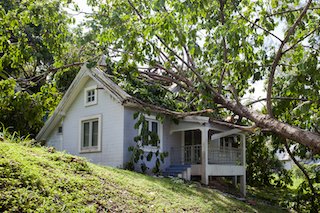When a homeowner suffers a loss and files a claim with their insurance company, many times the company responds by raising the homeowner’s premium or refusing to renew the policy. A new report by the Rutgers Center for Risk and Responsibility at Rutgers Law School in Camden, N.J., is offering recommendations to state lawmakers to ban the practice known as “Use It and Lose It.”
“It’s wrong, and states need to prohibit it,” says Jay Feinman, co-director of the Rutgers center and a distinguished professor at the law school. “Homeowners shouldn’t be penalized by their insurance companies because they actually use their insurance.”
The report, “State Rankings of Homeowners Insurance Protections: ‘Use It and Lose It,’” is part of the Essential Protections for Policyholders project, an initiative of the Rutgers Center for Risk and Responsibility in cooperation with United Policyholders, an advocacy organization and information resource for insurance consumers.
As part of the project, Feinman studied how states address the practice of “Use It and Lose It.”
The key findings of the report show that 18 states have no explicit protection against “Use It and Lose It.” The report ranks each state by the level of protections it provides for policyholders, with one star for offering little protection, up to five stars for strong protections.
Rhode Island and Texas received a five-star ranking for providing the best protection for consumers from improper rate increases and non-renewals for inquiries, claims closed without payment, and a single claim. No other state received five stars; Oklahoma and Washington D.C. each earned 4.5 stars.
Pennsylvania and Delaware each received four stars out of five. Both states have strong protections against an insurance company not renewing a policy because of an inquiry or claim, but Feinman says they could do better in preventing premium increases because of claims. Louisiana, Maryland, Minnesota and Montana also received four stars.
New Jersey earned a three-star rating for providing protection against non-renewal because of inquiries and weather-related claims but not for other kinds of claims such as when a pipe bursts, causing water damage. In addition, says Feinman, New Jersey laws don’t adequately protect against premium increases.
New York received a one-star rating for having no statutory prohibition on using an inquiry or a single claim as a basis for premium increase or non-renewal.
Twenty-one states overall received the one-star rating (see the complete state rankings below).
The Essential Protections report recommends ways that states can protect consumers. It suggests enacting laws that prohibit insurance companies from imposing a surcharge or a premium increase or not renewing a policy based on a single claim within three years, a claim that results in no payment by the company, an inquiry by a policyholder that does not result in a claim, or a single claim for loss caused by weather or a natural disaster.
“Consumer protection laws need to keep pace with changes in the marketplace,” says Amy Bach, executive director of United Policyholders. “Data mining and information sharing by insurance companies has put consumers at a costly disadvantage that needs to be remedied. State regulators and lawmakers don’t have to reinvent the wheel to fix this problem. A number of states have it right. Others can easily follow.”
The report has been distributed to insurance commissioners in every state. The entire report is available at epp.law.rutgers.edu.
Future reports from the Essential Protections project will evaluate states on how much information they provide to consumers shopping for insurance and what remedies are available when insurance companies unreasonably deny claims.
• Do you get blowback from clients about rates skyrocketing or their policies are not renewed following homeowners claims? Please comment on this thread: ‘Use It and Lose It’ homeowners coverage

State-by-State Ratings
5 Star States
Rhode Island
Texas
4.5-Star States
Oklahoma
Washington D.C.
4-Star States
Delaware
Louisiana
Maryland
Minnesota
Montana
Pennsylvania
3.5-Star States
Georgia
Michigan
South Carolina
3-Star States
Alabama
Arkansas
Connecticut
Florida
New Jersey
North Dakota
Wyoming
2.5-Star States
Utah
2-Star States
Arizona
California
Colorado
Iowa
Kentucky
New Hampshire
North Carolina
Tennessee
Vermont
1-Star States
Alaska
Hawaii
Idaho
Illinois
Indiana
Kansas
Maine
Massachusetts
Mississippi
Missouri
Nebraska
Nevada
New Mexico
New York
Ohio
Oregon
South Dakota
Virginia
Washington
West Virginia
Wisconsin













